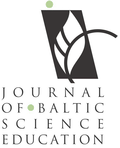RELATIONSHIPS AMONG TURKISH PRE-SERVICE SCIENCE TEACHERS’ GENETICS LITERACY LEVELS AND THEIR ATTITUDES TOWARDS ISSUES IN GENETICS LITERACY
| Title | RELATIONSHIPS AMONG TURKISH PRE-SERVICE SCIENCE TEACHERS’ GENETICS LITERACY LEVELS AND THEIR ATTITUDES TOWARDS ISSUES IN GENETICS LITERACY |
| Publication Type | Journal Article |
| Year of Publication | 2016 |
| Authors | Cebesoy, ÜB, Öztekin, C |
| Journal | Journal of Baltic Science Education |
| Volume | 15 |
| Issue | 2 |
| Start Page | 159–172 |
| Pagination | Continuous |
| Date Published | April/2016 |
| Type of Article | Original article |
| ISSN | 1648-3898 |
| Other Numbers | ICID: 1202143 |
| Keywords | Attitude, genetics literacy, pre-service science teachers, socio-demographic variables |
| Abstract | The importance of genetically literate individuals who can understand and join debates about genetics related issues, including gene therapy or cloning has been acknowledged by societies. With this respect, raising genetically literate individuals has become more prominent. Teachers’ knowledge in genetics literacy and their attitudes towards issues in genetics literacy influence their teaching practices. As a wide range of variables effect teachers’ genetics literacy levels and attitudes, this study examined how a set of variables including pre-service science teachers’ self-perceived interest, knowledge and importance of genetics, gender, academic achievement, socioeconomic status (household income, employment status and educational level of parents) are related to the their genetics literacy levels and attitudes towards various genetics literacy issues. Data was collected from 355 pre-service science teachers through administration of Genetics Literacy Assessment Inventory and Attitudes towards Issues in Genetics Literacy Scale. Canonical correlation analysis suggested that self-perceived interest and importance in genetics literacy issues, gender and parents’ educational levels were positively associated with participants’ genetics literacy levels, as well as attitudes towards the use of genetic information, gene therapy, and gene therapy applications. On the other hand, self-perceived knowledge, GPA, household income, employment status of parents were not found to be associated. |
| URL | http://oaji.net/articles/2016/987-1481916765.pdf |
| DOI | 10.33225/jbse/16.15.159 |
| Refereed Designation | Refereed |
| Full Text |
